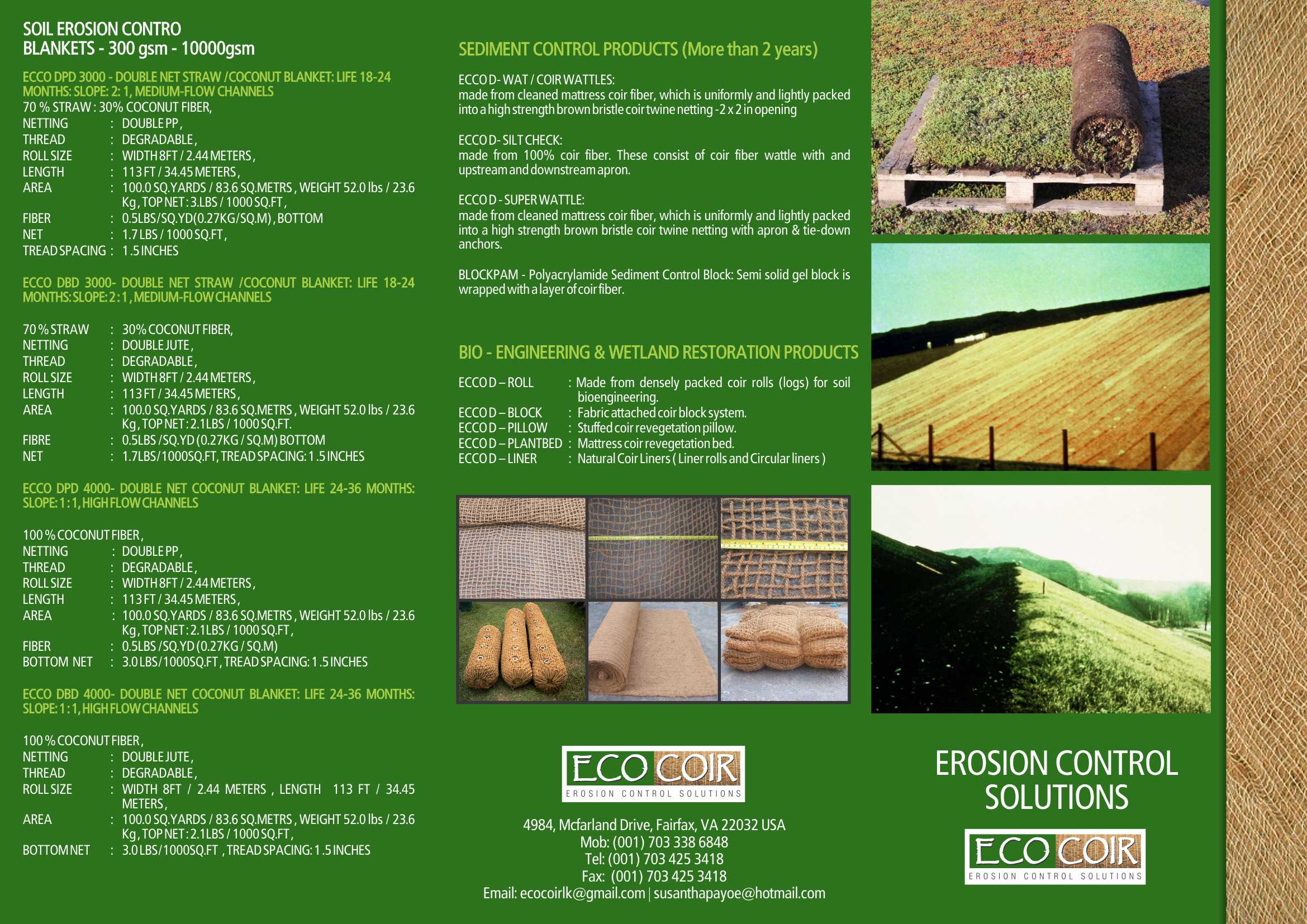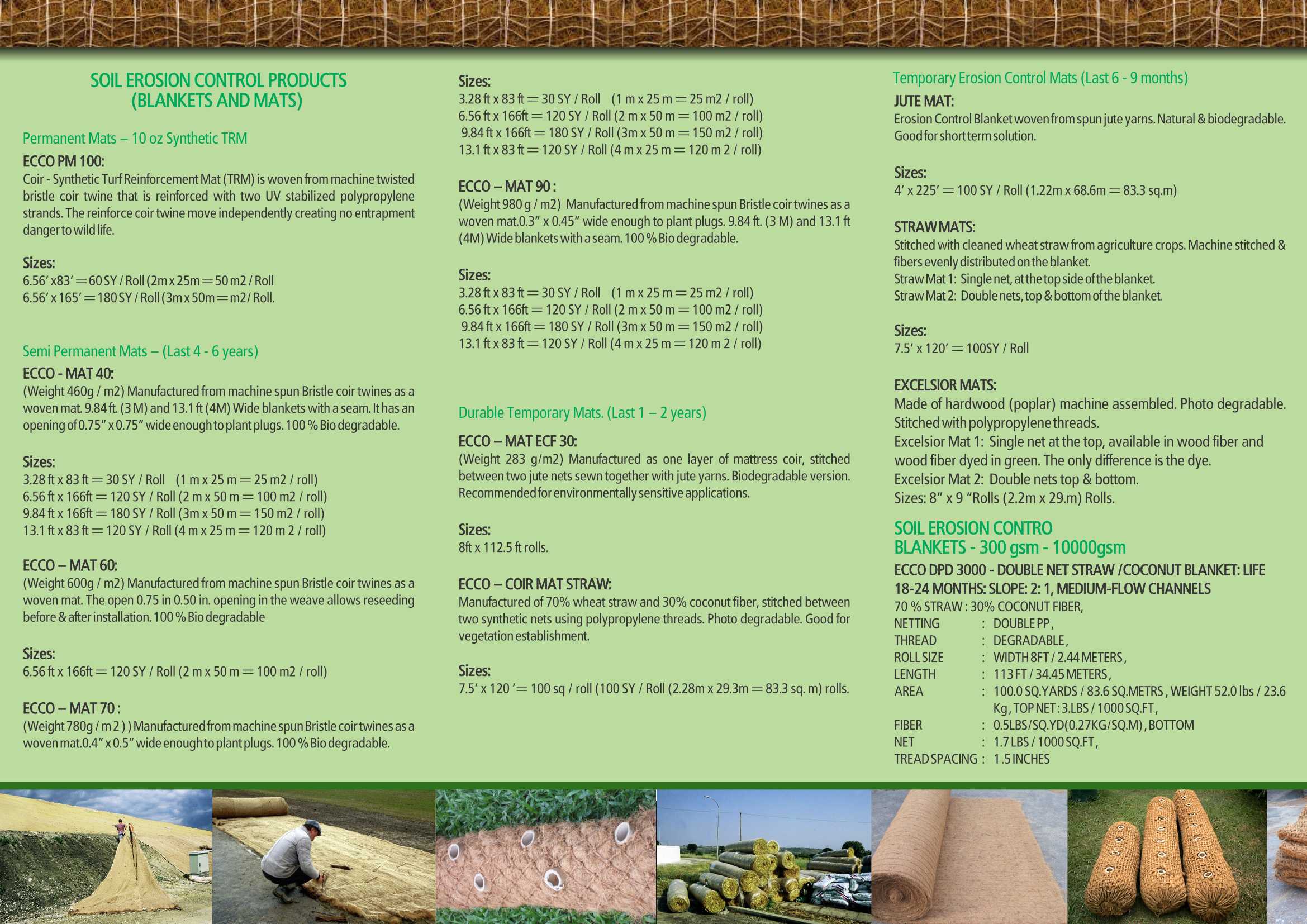GEO-HEART-PROJECT
DEVELOPING RURAL SRI LANKA
By Serendib’s ECOCOIR
Serendib’s ECOCOIR, is reaching out to Erosion Control & Wetland Restoration industry leaders to partner with GEO-HEART PROJECT to develop rural Sri Lanka. NO HAND OUTS, A FORWARD PURCHASE AGREEMENT will facilitate this effort. Urging green industry contractors, engineers, landscape architects & estimators to recommend and utilize Geo Component Products from GEO-HEART PROJECT for this noble cause. All that we request is a Forward Purchase Agreement (FPA).
This program will facilitate Geo Component Industry professionals to create a sustainable supply chain program by back ward integration of community based coco coir industry in Sri Lanka. Erosion Control & Green industry professionals to source their supplies with a human feeling, extending a hand in poverty elimination among the poorest of the poor.
Coir Sector Overview
The coconut palm (Cocos nucifera) has been called the “tree of life” in many cultures. Every part of the coconut palm, from leaves to roots are used by humans. The nut of the tree is used to produce coir, a natural fiber with a wide range of household and commercial applications. The fiber is extracted from the husk of the coconut between the outside surface and the hard inner shell. Coir is a renewable resource that is tough, durable, resilient, and naturally resistant to rot, mold, and moisture.
After the fibers are extracted from the husks, the coir can be spun into twine and rope, woven into sacks and nets, or made into doormats, brooms, brushes, or mattresses. In recent years, coir has also been used for a wide range of new applications. Automobile industry is now upholstering its seats with coir bonded together with natural latex rubber. Matted coir is also being used for insulation and packaging.
Agricultural and landscaping applications have also increased. Coir dust, which was once considered a waste product, is being sold as an environmentally friendly substitute for peat moss. Coir peat is used as a growing medium in intensive greenhouse horticulture. Coir peat and coir chips are used as soil additives to increase moisture retention and improve soil structure. Coir chips are also used as mulch to prevent weed growth. Coir bonded with natural latex is used to make natural pots and planters that are an attractive alternative to plastics.
There is also a growing demand for coir geo-textiles for erosion control applications, particularly on river banks and hillsides. Coir geo-textiles are used at construction sites and environmental restoration sites to prevent erosion and help natural vegetation take root. The market for coir geo-textiles increased substantially over the years.
Coir processing is a traditional cottage industry in Sri Lanka. The primary processing is often done at the household level. In Sri Lanka, it is estimated that 65,000 people are involved in the coir sector, and 80% of rural household production units are managed by women. While coir processing can be a valuable source of supplementary income, these small-scale producers have very little bargaining power. Exploitative relationships with traders are common.
Coir Industry in Sri Lanka
Coconut production is a competitive strength for Sri Lanka. Although the industry is quite mature, more and more uses for coconut fiber are being discovered. Because of coir’s qualities as a renewable and durable material, it is replacing other natural fibers and becoming the material of choice for many industrial applications such as car cushions, etc. Many industries are looking for potential partners to capitalize on the benefits of the renewable coir fiber. Demand for coir fiber has increased in recent years because of identification of several new applications. The greatest of which is geo-textiles for horticulture and erosion control.
We will be improving husk collection systems and by strengthening the supply chain will enable Sri Lanka to dramatically expand its coir production to meet the rapidly growing international demand. By maximizing the use of existing resources, the Sri Lankan coir sector has the potential to increase exports.
What We Aim To Do
As a social enterprise, Serendib’s ECOCoir combines doing business and doing social justice.
- We produce natural products made from renewable resources.
- We work with responsible contractors and companies to develop customized environmental solutions
- We develop fair trade relationships with coconut producers and coir processors and invest in rural communities to help them develop high-quality, environmentally friendly products.
- We are committed to developing triple bottom line account systems and reporting our social and environmental impact to all partners and stakeholders
Despite the fact that coir industry is threaten by synthetics, the global demand for coir fiber is on the increase due to the green technology encouraged by developed countries. However, most coir fiber production is done in small scale using low-tech methods and limited quality control making it difficult to meet the high standards required in developed countries. The value chain is dependent on the small players. Serendib’s ECOCoir strives to facilitate strategic marketing partnerships between these small scale producers and the end buyer.
Serendib’s ECOCoir focuses on identifying the market and customer requirement and then customizing the product through backward integration to suit the precise end user application. This unique concept adds further value to the coir fiber industry in Sri Lanka. Serendib’s ECOCoir ensures that our customers receive the best quality products at competitive prices while supporting the producers to get the best value for their products.
There is significant scope to enhance the coconut fiber value chain. Currently, most small scale processors lack expertise to market their product overseas and have limited access to credit, which allows them to be exploited by brokers / middlemen from countries who purchase their products at very low prices.
Serendib’s ECOCoir has developed a strategy to reach out to these marginalized processors and integrate them into a higher value supply chain.
Pricing & Partnership Strategy
Serendib’s ECOCoir geotextiles will be price competitive, but market differentiation will focus on two main strategic advantages:
- Serendib’s ECOCoir'sintegrated supply chain enables it to work with customers to develop customized environmental solutions.
- Serendib’s ECOCoir's integrated supply chain enables it to ensure that its products are sustainably sourced and contribute to rural economic development and environmental conservation in coconut producing areas.
While the initial focus will be on coir materials for construction contracts and environmental restoration, Serendib’s ECOCoir will expanded to develop partners for its product line for agricultural and landscaping applications as well.
Sri Lankan Operation
In Sri Lanka, there are hundreds of small scale producers of geo-textiles. The price of these products fluctuate greatly based on global demand as well as seasonal price of coconut husks. Serendib’s ECOCoir established a warehouse facility near the Colombo port. The benefits of establishing a warehouse facility are:
- Enable the company to purchase materials when prices are low & share it with buyers
- Establish a single point for quality control and inspection upon delivery
- Facilitate a network of suppliers and offer cash payment upon delivery
- Storage of product so any orders can be shipped within a couple of days
While the initial focus will be on coir materials for construction contracts and environmental restoration, Serendib’s ECOCoir will expanded to develop partners for its product line for agricultural and landscaping applications as well.
Our presence in both the United States and Sri Lanka enables us to develop an integrated and ethical supply chain, and gives us the flexibility to create specialized coir products to meet the unique needs of our customers, and the ability to directly support rural producers and ensure that all of our products are sustainably sourced, natural coir products for environmental applications.
U.S. Operations
While the Sri Lankan operation will focus on the supply of the product, the US operation will focus on sales, marketing and distribution. Initially, there will be two focal points in the US, one in Maryland and one in California. These two distributors will be able to purchase the products from the Sri Lankan operation, which require a 4-6 week lead time.
The main Serendib’s ECOCoir office in the United States is in Maryland, but warehouses will be established in different regions of the country to ensure rapid delivery and consistent product availability. Priority will be given to regions prone to adverse weather conditions.
Serendib’s ECOCoir is keen to develop marketing channels in the United States. The initial focus will be on developing relationships with agencies and companies involved in erosion control, environmental restoration, and green construction.
The International Erosion Control Association (IECA) has 3,000 members specializing in storm water management and natural resource protection. Serendib’s ECOCoir will participate in regional trade shows and forums through IECA.
Through the US Government’s General Services Administration (GSA), Serendib’s ECOCoir will develop relationships with contractors for the Department of Transportation(DOT) and the Environmental Protection Agency(EPA) that are required to employ environmental mitigation techniques.
Serendib’s ECOCoir will also develop relationships with architects, engineers and contractors through Leadership in Energy and Environmental Design (LEED), an environmental building certification system developed and administered by the U.S. Green Building Council (USGBC). LEED provides guidelines for sustainable building techniques and prioritizes resources that have a minimal ecological impact and are sustainability grown.


